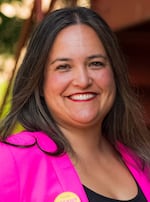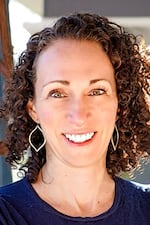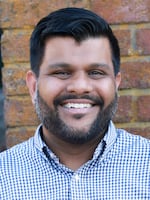
Members of the media tour the renovated council chambers at Portland City Hall, Nov. 15, 2024, which was expanded to accommodate the expanded 12-person council.
Kristyna Wentz-Graff / OPB
Tiffany Koyama Lane’s phone started ringing before her race was called on election night.
“Other candidates in the lead wanted me to commit to supporting them as council president,” said Koyama Lane, who was running to represent District 3, which covers much of Southeast Portland. “I wasn’t even sure if I had won.”
Koyama Lane did win. While the urgency of her fellow incoming councilors to nominate them to a powerful council position in January took her by surprise, the adrenaline behind the request did not.
“As the results came in,” she said, “I remember having this feeling like, ‘I want to go to City Hall right now and get to work!’”

Tiffany Koyama Lane, incoming councilor for Southeast Portland’s District 3.
Courtesy of the candidate
As Portland embarks on a new chapter of city government, its incoming city councilors have wasted no time thinking about how to strategically navigate the unique political landscape before them. Expectations are high. Not only do the politicians feel the need to follow through on promises made on the campaign trail, they are expected to keep the city running smoothly.
“They literally have to build the plane while they’re flying it,” said Laurie Wimmer, executive secretary and treasurer of the Northwest Oregon Labor Council. “And then you have a public that has magical thinking about everything changing smoothly overnight.”
Facing inherited budget woes, unfamiliar bureaucratic systems, and voters eager for a new direction, the incoming officials are expected to hit the ground running when they meet for the first time on Jan. 2.
“The challenge to them and all of us is to be patient,” Wimmer said.
A new playbook
Some of Portland’s incoming councilors have worked in city government before. But none of them have experience in the system of city government premiering in January.
Voters set the stage for this overhaul in 2022 when they passed a ballot measure chock-full of sweeping changes. That included increasing Portland’ five-person council to 12, establishing four geographic districts (with three councilors elected from each), and introducing a city administrator to oversee city departments previously run by City Council members. The measure also put in place a method of ranked choice voting that isn’t being used to elect city councils in any other major U.S. city. Proponents promised that ranked votes would lead to a more diverse and representative council.
The result: Portlanders elected a diverse group of people to City Hall. While the majority of incoming councilors (all Democrats) fall to the left of center politically, nearly half hold more centrist views, like wanting to add more police and penalize unhoused people for living outside. Six are women. Five are people of color. Four identify as LGBTQ+. Most have political experience, but some have spent their entire careers outside of government buildings.
Councilors will have 10 days of December onboarding classes, led by city staff, to prep them for the job. The sessions are voluntary, but councilors will receive a $500 stipend to participate. Koyama Lane, a public school teacher in Southeast Portland, doesn’t think class should be optional.

Council offices are still under construction at Portland City Hall, Nov. 15, 2024. The offices and work areas are being constructed in the area that formerly housed the Commissioner's offices and includes improvements in accessibility, technology and security, and seismic upgrades.
Kristyna Wentz-Graff / OPB
“We need to make sure we’re all on the same page heading in,” she said. “It’s a way to bond.”
Bonding was an overwhelming theme of this year’s council race. Koyama Lane said it was the likely result of campaigning in a ranked choice voting election, in which the top three vote-getters in each district won.
“There was a lot of incentive for people to be kind to each other, be collaborative, because these people might be your colleagues,” she said.
But political strategists say it’s inevitable that councilors will begin to splinter.
“Any team of 12, that’s big enough that you need to make coalitions around priorities,” said Craig Dorfman, a political consultant at Mandate Media, who has worked on council campaigns for over seven years. “Any one person’s priorities will require them to hold hands with six other folks to pass something. No one has experience doing that.” In the past, Portland council members would need to secure the votes of only two colleagues to advance a policy.
Another question is how the new council will work with Mayor-elect Keith Wilson.
Wilson, a political newcomer, will be holding a more administrative role than previous Portland mayors. He’ll be responsible for carrying out the policies that City Council votes on. Disagreement between his office and councilors could create tension.
“When problems arise, will council be blaming the mayor? Will the mayor blame council?” Dorfman said. “I think Wilson is fundamentally a cooperative person. But it’s a new dynamic.”

Mitch Green, incoming councilor for Portland’s District 4.
Courtesy of the candidate
Mitch Green was elected to District 4, which includes Portland’s west side and several southeast neighborhoods. Green is one of three councilors who are members of Portland’s Democratic Socialists of America. He said he’s already talking with his fellow socialists on council — like Koyama Lane — about forming a voting bloc with other progressive electeds. “And I know there will be an analog on the more moderate side of council,” Green said. “We need to be strategic.”
One of the first council votes will be a critical one: electing a council president. This leadership position is responsible for fielding other councilors’ policy proposals and choosing which will be heard and voted on at council meetings. At least half of the incoming councilors want the job.
“I was called to run for office because of my experience in government,” said Olivia Clark, another District 4 councilor, who worked as TriMet’s public affairs director and in former Gov. John Kitzhaber’s office. “And we’re going to need that experience in this new council. I’m ready to lead.”
While some are working the phones to whip votes, others are hopeful their fellow council members will see them as an obvious choice. That includes Loretta Smith, a former Multnomah County commissioner elected to represent East Portland’s District 1.
“I have experience in local government,” Smith said. “If my peers elect me to be president, then yes, I’ll take it. But I’m not actively going after it. I am here to represent my district.”
District representation is another new system for councilors to navigate. It’s largely up to councilors to decide how they share responsibilities with their two other district colleagues. Several incoming councilors say they’d like to jointly attend neighborhood meetings and engage with constituents who reach out to their district office. (The incoming council will decide locations for those offices.)
Green said he sees divvying up roles based on policy expertise. With a focus on environmental issues and the economy, Green said he’d allow his other District 4 colleagues — Clark and Eric Zimmerman — to take the lead on addressing public concerns on policing. Zimmerman and Clark were both endorsed by Portland’s police union.
“There are areas where I’m not a subject matter expert,” Green said. “I can trust Eric or Olivia on public safety. That’s potentially delivering them a political win. But winning back the faith of this electorate is critical.”
Smith is less convinced by this tactic.
“It’ll be wise to coordinate,” she said. “But at the same time, when you go on the ballot, you go on the ballot by yourself. People are going to gauge you for what you were able to get done.”
Following through on campaign promises
Most new councilors spent time on the campaign trail earning votes and crucial endorsements by pledging swift change, whether that be a promise to bolster renters rights, hire more police officers, or expand Portland Street Response. And City Commissioners Rene Gonzalez, Carmen Rubio and Mingus Mapps all lost their mayoral bids. City Commissioner Dan Ryan won a council seat, leaving him the only incumbent on council. Voters showed a desire for different ideas in City Hall.
“The pressure to get things done … to follow through on pledges, it’s real,” Green said. “I want to make sure the new council avoids falling into the trap of saying, ‘Well we had to get the new government all set up so we really couldn’t do anything.’ That’s not going to fly.”

Elana Pirtle-Guiney, incoming councilor for North Portland’s District 2.
Courtesy of the candidate
Some councilors don’t see their campaign priorities being hindered by the new system. Elana Pirtle-Guiney, an incoming councilor for North Portland’s District 2, said her biggest campaign pledge was ensuring the new form of government worked.
“I truly think that’s what we need to focus on,” she said. “Because if we don’t get this system right, the consequences of that will be long lasting for our city.”
And new councilors with rigid policy agendas will be delayed in advancing them once they step into City Hall. Along with learning the ropes of the new governance system, the new council will need to focus on several timely issues, like passing a budget in the face of massive funding shortfalls, choosing what policies to lobby for during the state’s January legislative session, and deciding whether to advance new taxes to the May ballot.
Sameer Kanal, an incoming councilor for North Portland’s District 2, lamented the number of unfinished projects the current council is passing off to next year’s body to address. He pointed to the city’s mounting backlog of building and street maintenance projects and its frayed relationship with Multnomah County as examples.
“One of the big challenges is the sheer volume of problems that have not been solved and, in a few cases, have been exacerbated by previous councils,” said Kanal. “There’s a lot to do. At the same time, there’s a justifiable impatience and lack of trust in our local government from everyday Portlanders.”

Sameer Kanal, incoming city councilor for North Portland’s District 2.
Courtesy of the candidate
And they’ll be doing it with little help. Despite a recommendation from city transition leaders to allow each new councilor to hire two staffers, the current City Council passed a budget that only pays for a single staff member per councilor (current council members have between six and seven employees each).
Kanal said that’s not enough staff. He and several other new councilors say that finding the political will — and the money — to hire more help is a top priority.
Meeting expectations
Organizations and voters that helped propel candidates into City Hall are watching.
Portland for All is a volunteer-run nonprofit and political committee that campaigned on behalf of progressive council candidates. Portland for All’s board chair, Andrés Oswill, said the group expects all candidates it endorsed to continue listening to Portland for All members after they enter office.
“We often see candidates get tight with communities during an election, but when they get into office you don’t hear from them until they’re running for reelection,” Oswill said. “It’s important for us that candidates bring the folks that supported them along every step of the way.”
Yet Oswill is realistic about what to expect from the new councilors who, he said, “have been thrown to the wolves” without adequate staffing and facing weighty policy decisions.
“Accountability without support is just causing harm,” he said. “They need us to help them be successful.”
Expectations may be the highest for councilors representing Portland’s District 1, which includes almost all neighborhoods east of Interstate 205.

Renovation of the council chambers at Portland City Hall is nearly complete, Nov. 15, 2024.
Kristyna Wentz-Graff / OPB
In Portland’s history, only two members of City Council have lived in this area, leading to these neighborhoods’ concerns being systematically overlooked in City Hall. It’s also led to disproportionately low voter turnout year after year. Only 55% of registered voters in this district cast votes in the 2020 presidential election. This election, that number was 56%. And according to data analysis by the Oregonian/OregonLive, of the District 1 residents who voted in this month’s election, 29% did not vote in the City Council race.
Jose Gamero-Georgeson is a member of the David Douglas School Board and volunteers with East County Rising, a political committee that supports candidates who focus on improving East Multnomah County.
“East Portland has always gotten the short end of the stick, they’re told things are going to happen and then they don’t,” said Gamero-Georgeson, who also chairs the city committee overseeing the government transition. “They’re not engaged. If you have a group of people historically left out of all these decisions, they aren’t going to show up.”
With three councilors elected to represent this district, there’s hope for true representation. Gamero-Georgeson said he expects councilors to demonstrate that East Portlanders’ voices matter in City Hall.
Smith said she and her district colleagues are up to the task.
“East Portland constituents have been waiting way too long for representation,” she said.
Little is certain about how the incoming council will work together — or divided — to keep Portland’s new government moving forward. But everyone agrees, both inside and outside City Hall, that it will be imperfect.
To political consultant Dorfman, that’s a feature, not a bug.
“There will have to be some growing pains,” he said. “If there aren’t, then something’s really wrong.”
